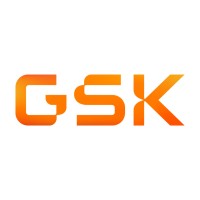
GSK
We are uniting science, technology and talent to get ahead of disease together. Our community guidelines: https://gsk.to/socialmedia



We are uniting science, technology and talent to get ahead of disease together. Our community guidelines: https://gsk.to/socialmedia

Established in 1984, we are a global pharmaceutical company headquartered in Hyderabad, India. Driven by our purpose of ‘Good Health Can’t Wait’, we work to provide access to affordable and innovative medicines. We offer a portfolio of products and services including APIs, generics, branded generics, biosimilars and OTC. Our major markets include USA, India, Russia & CIS countries, China, Brazil and Europe. As a company with a history of deep science that has led to several industry firsts, we continue to plan ahead and invest in future growth drivers such as access to novel molecules, digital therapeutics and consumer healthcare. As an early adopter of sustainability and ESG actions, we released our first Sustainability Report in 2004. Our current ESG goals aim to set the bar high in environmental stewardship; access and affordability for patients; diversity; and governance. For more information, log on to: www.drreddys.com. Caution Notice: Dr. Reddy's has been made aware of candidates receiving fraudulent job opportunities from unauthorised recruiting agencies or people impersonating Dr. Reddy's leaders. These fraudulent jobs may be advertised on employment sites or mimic our careers site and company email addresses. Please know that Dr. Reddy's Laboratories has no affiliation or connection to these situations. Dr. Reddy's (and its associated/group companies) follows a formal recruitment process through its own HR department. Please report immediately in case you suspect a fraudulent job. You may raise your concern by: Accessing https://drreddys.ethicspoint.com. Calling on the hotline number. List of hotline numbers are available in https://drreddys.ethicspoint.com. The hotline is available 24x7 in multiple languages. Writing to [email protected] or [email protected]. For our community guidelines on LinkedIn, please visit: https://shorturl.at/LTvNZ
Security & Compliance Standards Overview












No incidents recorded for GSK in 2025.
No incidents recorded for Dr. Reddy's Laboratories in 2025.
GSK cyber incidents detection timeline including parent company and subsidiaries
Dr. Reddy's Laboratories cyber incidents detection timeline including parent company and subsidiaries
Last 3 Security & Risk Events by Company
Angular is a development platform for building mobile and desktop web applications using TypeScript/JavaScript and other languages. Prior to versions 19.2.16, 20.3.14, and 21.0.1, there is a XSRF token leakage via protocol-relative URLs in angular HTTP clients. The vulnerability is a Credential Leak by App Logic that leads to the unauthorized disclosure of the Cross-Site Request Forgery (XSRF) token to an attacker-controlled domain. Angular's HttpClient has a built-in XSRF protection mechanism that works by checking if a request URL starts with a protocol (http:// or https://) to determine if it is cross-origin. If the URL starts with protocol-relative URL (//), it is incorrectly treated as a same-origin request, and the XSRF token is automatically added to the X-XSRF-TOKEN header. This issue has been patched in versions 19.2.16, 20.3.14, and 21.0.1. A workaround for this issue involves avoiding using protocol-relative URLs (URLs starting with //) in HttpClient requests. All backend communication URLs should be hardcoded as relative paths (starting with a single /) or fully qualified, trusted absolute URLs.
Forge (also called `node-forge`) is a native implementation of Transport Layer Security in JavaScript. An Uncontrolled Recursion vulnerability in node-forge versions 1.3.1 and below enables remote, unauthenticated attackers to craft deep ASN.1 structures that trigger unbounded recursive parsing. This leads to a Denial-of-Service (DoS) via stack exhaustion when parsing untrusted DER inputs. This issue has been patched in version 1.3.2.
Forge (also called `node-forge`) is a native implementation of Transport Layer Security in JavaScript. An Integer Overflow vulnerability in node-forge versions 1.3.1 and below enables remote, unauthenticated attackers to craft ASN.1 structures containing OIDs with oversized arcs. These arcs may be decoded as smaller, trusted OIDs due to 32-bit bitwise truncation, enabling the bypass of downstream OID-based security decisions. This issue has been patched in version 1.3.2.
Suricata is a network IDS, IPS and NSM engine developed by the OISF (Open Information Security Foundation) and the Suricata community. Prior to versions 7.0.13 and 8.0.2, working with large buffers in Lua scripts can lead to a stack overflow. Users of Lua rules and output scripts may be affected when working with large buffers. This includes a rule passing a large buffer to a Lua script. This issue has been patched in versions 7.0.13 and 8.0.2. A workaround for this issue involves disabling Lua rules and output scripts, or making sure limits, such as stream.depth.reassembly and HTTP response body limits (response-body-limit), are set to less than half the stack size.
Suricata is a network IDS, IPS and NSM engine developed by the OISF (Open Information Security Foundation) and the Suricata community. In versions from 8.0.0 to before 8.0.2, a NULL dereference can occur when the entropy keyword is used in conjunction with base64_data. This issue has been patched in version 8.0.2. A workaround involves disabling rules that use entropy in conjunction with base64_data.